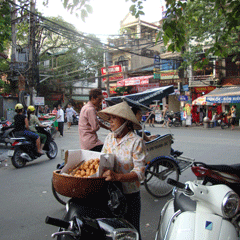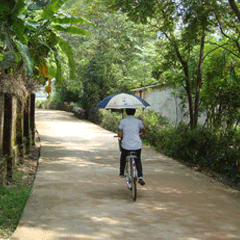
|
| Downtown Hanoi. Photo: Andrea Zeman/Cities Alliance |
[1 November 2011] -- While the developing Country Programme in Mozambique begins its first activity in November, the Cities Alliance Country Programme in Vietnam continues to move forward and scale up.
One of the fastest urbanising countries in East Asia, Vietnam has undergone a remarkable process of economic reform in recent decades that has spurred economic growth and driven an urbanisation rate of around 3 per cent per year.
At the same time, the country has made great strides in reducing urban poverty. Since the Cities Alliance began engaging with Vietnam in 2000, the country’s focus has moved from pilot upgrading projects to broad-based upgrading programmes.
The challenge now is to scale up urban upgrading to the national level and to mobilise the urban poor so that they benefit from the Vietnam’s economic growth as well.
Within that context, the first phase of the Cities Alliance Country Programme in Vietnam focuses primarily on three main areas: rolling out the National Urban Upgrading Programme (NUUP), strengthening the Vietnam Urban Forum, and expanding the existing Community Development Fund (CDF) network. It also includes the production of a Vietnam Urbanisation Review to provide overall urban policy guidance.
Scaling up urban upgrading and revitalising a forum for debate
As part of its efforts to scale up its upgrading programmes, the Government of Vietnam has formulated a National Urban Upgrading Programme. Finalised in 2008, the programme provides, for the first time, an overall demand assessment and cost estimate for urban upgrading in low-income areas in more than 100 cities and towns throughout Vietnam.
The Cities Alliance Country Programme is supporting the development of a detailed strategy to guide the rollout of the NUUP through 2020. The activity is being implemented by the Ministry of Construction, which was responsible for the formulation and preparation of the NUUP.
Also on the national level, the Country Programme is supporting the revitalisation of the Vietnam Urban Forum as a platform for discussion on urban issues.
|
Vietnam has a population of around 85.8 million, of which 25.4 million live in cities – a figure that is expected to double by 2025.
|
Originally launched in 2003, the Forum is garnering new attention as a result of the debate surrounding the NUUP. It will also inform stakeholders by regularly reviewing and reporting on the state of urban development programmes in Vietnam (including the NUUP). The most recent Forum was held 28 October 2011.
The grant agreement between the Cities Alliance and the Ministry of Construction to undertake both of these activities was finalised in June 2011. This past October, the Ministry convened a meeting with key stakeholders in Hanoi to discuss next steps in moving forward with the programme and how the grant funding will be used.
These stakeholders included the Urban Development Agency, part of the Ministry of Construction; the World Bank, which is supervising both activities; UN-HABITAT, which is contributing co-financing and supporting the Forum; the Deutsche Gesellschaft für Internationale Zusammenarbeit (GIZ), which provides direct technical support to the UDA; and the Association of Cities of Vietnam (ACVN), which will play a key role in bringing cities into the Forum discussions.
The Cities Alliance was represented at the meeting by Urban Specialist Andrea Zeman, Sr. Programme Assistant Susanna Henderson, and Terry Standley, a consultant on the initiative.
In addition to these activities, the Country Programme also includes the production of a Vietnam Urbanisation Review, a strategic analysis of the country’s urban transformation that will guide the Government’s urban policies at the national and local level. The Review, which is being produced by the World Bank, is currently in the final stages of development.
The Community Development Fund (CDF) Network of Cities
One of the key features of a Cities Alliance Country Programme is that it seeks to align urban development efforts at the national, city and community levels. In Vietnam the city and community component of the programme focuses on strengthening and expanding the Community Development Fund network, a network of 28 cities engaged in community-led development activities.
This part of the programme is being implemented by the Association of Cities of Vietnam (ACVN), a network of cities that represents the interests of local governments in the country. It is also a member of the United Cities and Local Governments (UCLG). The ACVN currently has 96 member cities, of which 28 are part of the CDF network.
Cities Alliance grant funding will be used to mobilise and empower communities by setting up savings groups, establishing a CDF at the city level, and undertaking citywide community mapping in the participating cities. This mapping, which will be schematic rather than physical, provides a common framework that the cities can use to identify key issues and prioritise their interventions.

|
| During an October 2011 field visit to Vietnam, the Cities Alliance team visited cities that have implemented CDF projects, including this paving project in Viet Tri. Photo: Andrea Zeman/Cities Alliance |
Grant funds will also be used as seed capital, together with community and city contributions, for priority small-scale community projects.
The Cities Alliance support will serve to strengthen the citywide, community-driven upgrading processes in those cities that are already part of the CDF network and expand them to new cities.
To date, ACVN has almost finalised the preparatory phase of the programme. It has developed an operational manual for the CDF, which includes information on conducting mapping exercises, implementing small community-driven upgrading projects, and financial management guidelines.
The ACVN has also conducted training workshops for CDF network members and solicited feedback from them on the contents of the operational manual.
During their field visit to Vietnam in October, Ms. Zeman, Ms. Henderson and Mr. Standley had the opportunity to visit two cities with well-established CDFs and see some of the community-led upgrading efforts in action. These included small-scale projects such as drainage and paving pathways in the cities of Vinh and Viet Tri. They also visited a third city – Ninh Binh – that is interested in joining the CDF network.




